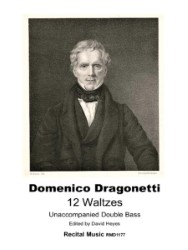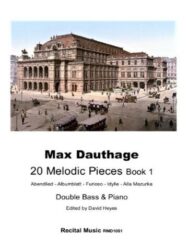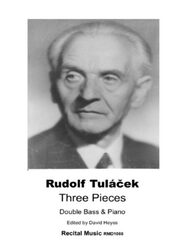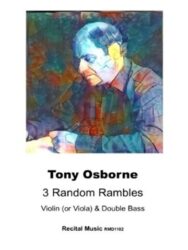Bass Clef Unaccompanied Solos Book 2
21 Pieces for Unaccompanied Double Bass
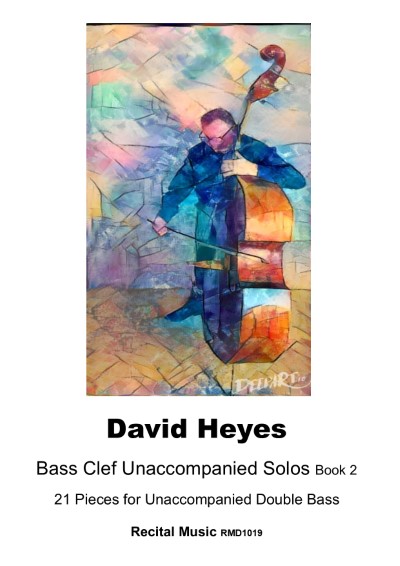
| Product Code: | RMD1019 |
| Publishers Number: | RMD1019 |
| Language: | English |
| Condition: | New |
2. Three Nocturnes
3. Moonshine
4. Desert Landscapes
5. George strolls along the Left Bank
6. Riff-Raff!
7. Postcard No.3
8. Valse Sentimentale
9. Waltz-Time
10. That’s Life!
11. Shadows & Silhouettes
12. Dreamcatcher
David’s collaborative work gained him a prestigious award from the David Walter Charitable Trust of New York for his pioneering activities as a soloist, teacher, publisher, and commissioner of new music for double bass and he works with composers throughout the world to expand the double bass repertoire by commissioning new music and by rediscovering forgotten ones. Since 1983 more than 700 works have been written for him, music from one to twenty basses and from beginner to virtuoso, and he has premiered ten contemporary concertos with orchestra.
David began to compose in 2013 and has had music performed and recorded in 29 countries across five continents. He is a D’Addario Performing Artist and has recently commissioned a solo double bass from British master-luthier Martin Penning.
Bass Clef Unaccompanied Solos Book 2 brings together 21 pieces for unaccompanied double bass, all composed for friends and students of David Heyes in recent…
Some pieces are short and succinct, others more extended, but none outstay their welcome and all are ideal as study or recital, Repertoire.
A Small Suite
David Heyes writes: “This was a fascinating commission to accept and something which offered many different challenges. How to make each piece interesting, when only playing a limited number of stopped notes in the lower positions; how to link them to the octave harmonics alongside artificial harmonics in 3rd and 4th positions; and how to make the harmonics interesting when there were so few to choose from. There was the added difficulty of balancing the musical and technical issues with producing pieces which were interesting to play and would hopefully be of use as concert pieces. I hope, as a whole, the suite fulfilled the brief and I have to admit that I loved writing each piece. The final one was composed on Good Friday (2 April 2021) and was inspired by a TV programme about the Holy Land. The titles are about light or times of the day and ‘Sunset’ seemed a perfect place to end.”
“I am so grateful to David Heyes for writing “A Small Suite” for my students. Over the years I have had a number of students with various left hand injuries or weaknesses. After focusing on lots of bow work, these students are desperate to have pieces they can play while gradually increasing their left hand strength. Quite frankly, I was at a loss trying to find music that would engage them and help them grow, both as bassists and as musicians.
This is why in March of 2021, I asked David to write some music with lots of harmonics and a small amount of “stopped” or “pressed down” notes. With this suite, students have the ability to work on pieces that don’t tax their left hand too much; they can actually build left hand strength and have fun!
This suite is even more beautiful than I could have ever imagined and my students love it! These pieces would also be engaging and fun for anyone who is still getting comfortable with our beautiful beastly instrument!” [Susan Hagen / Principal Bass This suite is even more beautiful than I could have ever imagined and my students love it! These pieces would also be engaging and fun for anyone who is still getting comfortable with our beautiful beastly instrument!” [Susan Hagen / Principal Bass, Boston Pops Orchestra / Assistant Professor of Double Bass, Berklee College of Music, Boston, USA]
Three Nocturnes
I was very pleased to receive a commission from my great friend Kel (P Kellach Waddle) in Texas for three short pieces for unaccompanied double bass for a concert series in March/April 2019. He asked that they would not be difficult, which they aren’t, and about a minute each. In fact, the three last around four minutes in total and can be played singly, as a suite or in any order. ‘Three Nocturnes’ was composed in November and December 2018
and revised and completed on 26/27 December.
The overall mood is dark and evocative, exploring the lower register of the double bass primarily, with slow tempi and a generally expressive and legato feel throughout. Nocturne No.2 employs simple harmonics in lower positions with an open string drone played pizzicato, contrasting the dark and brooding sounds of the first nocturne which is slow moving and sonorous.
Nocturne No.3 has more momentum than the other two, but is still rhapsodic and sustained, with changing bar lengths and a recurring melodic motif which adds unity and cohesion. The tempos remain fairly constant throughout, although the music should have ebb and flow, with a palette of dark colours to explore the mysterious and atmospheric potential of the solo double bass.
Moonshine
‘Moonshine’ was commissioned by P Kellach Waddle in Texas, to whom it is dedicated, with the brief of a work lasting about 90 seconds and with a ‘beverage theme’ for a concert in July 2016. Moonshine is one name used to describe a high-proof distilled spirit, usually produced illicitly. There are several explanations about the word ‘moonshine’ which is believed to be derived from the term ‘moonrakers’ used for early English smugglers and the clandestine nature of the operations of illegal Appalachian distillers, or because it was mostly distilled at night “by the light of the moon”.
This short piece contrasts episodes of slow reflection, probably with the aid of some local homebrew, with fast and frenetic music describing the excitement and thrill of the chase, or the enjoyment of drinking moonshine with friends. Will the moonshiners and their stills be found? Can they evade the authorities? A recurring rhythmic figure adds energy and momentum, occasionally interrupted with short interjections played sul ponticello, to describe a slight inebriation. A slow and relaxed lyrical phrase, also playable with portamenti, adds a moment of repose before the chase resumes ending with drama and finality. Were the moonshiners found? Probably not…
“OMG I love it !!! what a hoot !! … I wouldn’t have imagined moonshine would be prestissimo
.. but I LOVE when my own idea is subverted… love it .. this is a wonderful little piece and I have decided instead of 2nd to last .. It will be the LAST of the 11 piece set of yours I shall do on that late July concert !! thank you so much !! :” [P Kellach Waddle]
Moonshine was premiered on Tuesday 27 September 2016 at the Salon de usos multiples, Bibliotca de las artes, Mexico City by Marco Antonio Quiñones Martinez.
Desert Landscapes
‘Desert Landscapes’ was composed for Holly Reinhardt, one of my young students, who had played ‘Sahara’ and said it was “her favourite double bass piece ever!” I decided to write something in a similar vein to ‘Sahara’, which remains in bass clef and features a wealth of playing techniques and colours, and it was completed during the second lockdown of 2020.
‘Desert Landscapes’ includes arco melodies, pizzicato, sul ponticello, tremolando, col legno,
double stops, harmonics and left-hand pizzicato, and is a patchwork of short motifs and themes echoing the brilliant colours, breath-taking landscapes and ever changing sand dunes and desert landscapes. The colours and shapes of the dunes constantly change and the piece is a musical landscape of some of the most spectacular and arid places on earth.
Desert Landscapes was premiered in Oxford (UK) in September 2020 by Holly Reinhardt, its dedicatee, and was revised soon afterwards.
George strolls along the Left Bank
‘George strolls along the Left Bank’ [Paris, France] is from ‘George’s Grand Tour’, a collection of eight colourful solos for the progressing young bassist. Imagine walking along the Left Bank in Paris, on a sunny summer’s afternoon, when you hear the distant sound of an accordionist playing a lyrical and relaxed Parisian waltz. The music is evocative and colourful and fades away as you walk towards a beautiful and elegant carousel which is gradually slowing down.
“George is one of my young students and was the inspiration for ‘The Adventures of George’, composed during the first lockdown in 2020, one piece each week. Susan Hagen commissioned me to write a follow-up book and, using the Grand Tour as my theme, it was possible for George to ‘visit’ different European cities. I chose five which I had visited in recent years (Prague, Wells, Istanbul, Paris, Vienna) alongside three (Helsinki, Moscow, Venice) which I hope to visit very soon. Each city has its own character and style and I aimed to encapsulate the energy, beauty, and vibrancy in a short and colourful piece for unaccompanied double bass.” [David Heyes]
“As I’ve been teaching, I have noticed a need for pieces in what I lovingly call “The Danger Zone” of the fingerboard. At some point, we all need to spend a little time getting comfortable in the region of the fingerboard that exists right before Thumb Position. I was at a loss for music that would be great for this purpose. I have used many combinations of etudes and solos but nothing was truly addressing the issues I found students had – I didn’t mind that each etude I found was a bit boring, though I’m sure my students did! But each solo I assigned would merely pass though the Danger Zone, never keeping the player in that region long enough to help them become comfortable.
In the fall of 2020, I asked David Heyes to write some pieces, perhaps a next level higher than The Adventures of George in order to help my students. David created such gems in George’s Grand Tour that no one noticed how proficient they were becoming in the Danger Zone! The pieces are fun, technically challenging, and musically rewarding. David has included extended techniques so the players can also explore the beautiful colours the double bass is able to create. I predict George’s Grand Tour will become a staple in many double bass studios around the world, as it has in mine.” [Susan Hagen / Principal Bass, Boston Pops Orchestra / Assistant Professor, Berklee College of Music, USA]
“I’ve just taken a minute (finally) to read through the Grand Tour album and it is magnificent! I cannot wait to start using this when my 11-year-old finished up her first book of George’s Adventures. Thank you, thank you for creating these little gems!” [Gaelen McCormick / Eastman School of Music, USA]
Riff-Raff!
‘Riff-Raff!’ was composed for Raphael Davey, one of my young students, and uses a limited number of notes and positions in the lower register of the instrument. Known to his family and friends as Rafi, the piece is fun, lively and rhythmic, with a constant energy which totally reflects the spirit and personality of Rafi. Repetitions are used to create cohesion and unity alongside col legno, sul ponticello, percussion and harmonics which add interest and variety, and Riff-Raff! was composed as both a study and recital piece.
Postcard No.3
‘Postcards from Prague’ is played pizzicato throughout and is a suite of seven short snapshots of Prague and inspired by my first visit to the Czech capital in 1986. A range of pizzicato styles or techniques can be employed to vary the colours and timbres of each movement.
‘Postcard No.3’ (Lento) depicts the stillness and history of the Old Jewish Cemetery in Prague which dates back to the first half of the 15th-century. The music is peaceful and slow moving, with a recurring ringing open D string acting as a drone, and a simple melodic line which emphasises the sonorous qualities of the double bass in its lower register.
Valse Sentimentale
‘Valse Sentimentale’ was composed in 2020, during one of the lockdowns, as a 28th wedding anniversary present for David and Kathy MacGeoch. It was premiered at an open- air concert in their garden in Glastonbury on Saturday 5 September 2020, when it was possible for a small number of people to meet outdoors as long as everyone was socially distanced. In 3/4 time, it has an old world charm and elegance, harking back to a different time, allowing the double bass to sing throughout its middle and higher register.
Waltz-Time
Composed in 2021, ‘Waltz-Time’ is the seventh piece from ‘Scaling the Heights’ and has been transposed a fifth lower and into bass clef. The music is charming and lyrical, encouraging the bassist to develop a ‘singing’ quality and to focus on bow speeds and placement to ensure long melodic lines.
That’s Life!
‘That’s Life!’ is played pizzicato throughout and employs a number of jazz and contemporary effects. It was composed for Jim Rintoul who had an interesting career, including a number of years as a successful rock musician in Japan, and now performs both as a classical and jazz bassist in the South-west of England. ‘That’s Life!’ is jazz-inspired with the addition of a few effects which are common to classical and contemporary styles such as glissandi, ‘hammer-on’, pedal notes and left hand pizzicato. It has a strong rhythmic momentum and drive, remaining in bass clef throughout.
Shadows & Silhouettes
‘Postcards for Pošta’ is a suite of six one-minute pieces for unaccompanied double bass composed in memory of František Pošta (1919-1991), each dedicated to a different musical friend in the international double bass community.
‘Shadows & Silhouettes’ is dedicated to Elsen Price in Australia and is the third of the set. The music is built on three letters from Elsen’s name [C, E, E flat] with Frantisek Posta’s
name in bar 9 [F, A, E, E flat] and is a description and feeling of the dark and mysterious corners of old Prague. The many cobbled streets and hidden squares exude the magical history of the city and its inhabitants, of legend and folklore, ghosts and spirits. The music is episodic, atmospheric, and evocative, exploring the myriad colours of the solo double bass and lasts around one minute in duration.
Dreamcatcher
‘Dreamcatcher’ was completed on 9 June 2022 and was composed for a talented young bassist called Benjamin Alge. The musical material is based on four letters’ from Ben’s name (BEAG) and explores a wealth of colours and playing effects available to the progressing young bassist. The title influenced the mood and atmosphere of the piece, with short motifs and repetitions, reminiscent of our dreams when asleep, and it lasts a little over three minutes.
‘Dreamcatcher’ uses traditional notation to create evocative soundscapes and the ever changing moods and tempos achieve a restless quality before gradually falling away into a peaceful sleep, abruptly interrupted by the final pizzicato chord.
The sound world, on the whole, is atmospheric and mysterious, written in an episodic style and exploring a range of colours and textures in the orchestral register of the double bass. The tempo marking ‘free and rhapsodic’ indicates the overall mood and style of the piece, with sections marked meno mosso or più mosso to add variety and contrast. B flat/A sharp is the only accidental used within a modal idiom, creating musical and stylistic challenges with a limited number of notes and rhythms.
Digital Download – PDF
Shipping costs: No shipping
R.R.P £10.00
Our Price: £8.50
You might also like
-
12 Waltzes for Double Bass
£7.23 -
20 Melodic Pieces Book 1
£7.23 -
3 Pieces for Double Bass and Piano
£10.63 -
3 Random Rambles
£7.23

